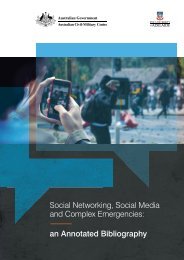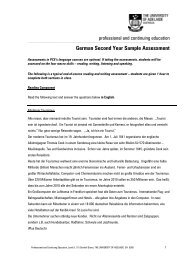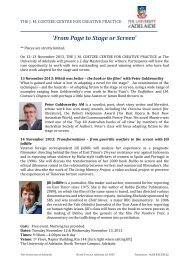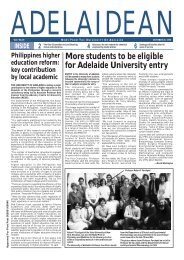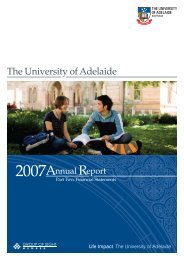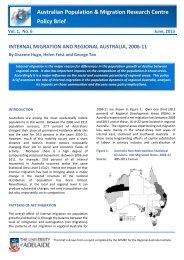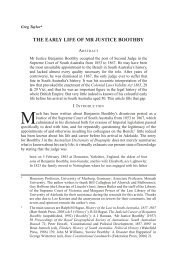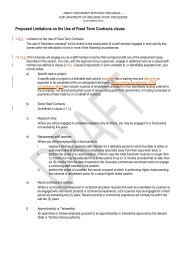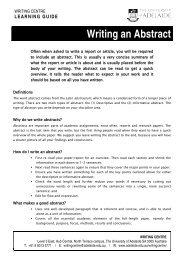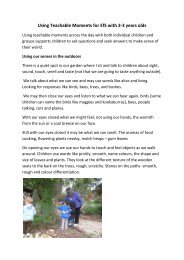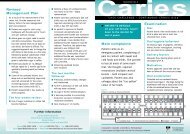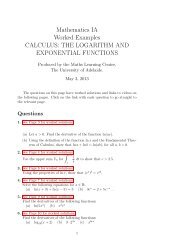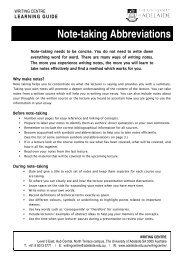Unbridling the Tongues of Women - The University of Adelaide
Unbridling the Tongues of Women - The University of Adelaide
Unbridling the Tongues of Women - The University of Adelaide
You also want an ePaper? Increase the reach of your titles
YUMPU automatically turns print PDFs into web optimized ePapers that Google loves.
<strong>Unbridling</strong> <strong>the</strong> tongues <strong>of</strong> women<br />
bour movement once again demonstrated its support for <strong>the</strong> feminist cause in a<br />
move which <strong>the</strong> historian, Helen Jones, has discovered recently. Taking advantage <strong>of</strong><br />
a clause added to <strong>the</strong> suffrage bill in committee, in an attempt to wreck it, unions<br />
nominated both Spence and Mary Lee for selection as candidates for <strong>the</strong> election to<br />
<strong>the</strong> House <strong>of</strong> Assembly in 1896. <strong>The</strong>y both declined <strong>the</strong> honour. Mary Lee did not<br />
want to be bound ‘by pledge or obligation to any party whatever’, and nor did Ca<strong>the</strong>rine<br />
Spence whose effective voting campaign had established that fact publicly. 69<br />
But how warmed Spence must have felt at such a signal mark <strong>of</strong> favour from <strong>the</strong><br />
people who stood most firmly for democracy in South Australia.<br />
At <strong>the</strong> ga<strong>the</strong>ring in <strong>the</strong> Café de Paris, Spence observed: ‘When women receive <strong>the</strong><br />
right to vote <strong>the</strong>n work would only just begin’. 70 She was not alone in recognising<br />
that institutionalising formal political equality between women and men would<br />
highlight ra<strong>the</strong>r than eliminate <strong>the</strong> continuing social subordination and economic<br />
inequality <strong>of</strong> women. <strong>The</strong> boundary between <strong>the</strong> sphere <strong>of</strong> domestic and public<br />
life might have shifted but it had not removed <strong>the</strong> boundary between <strong>the</strong> separate<br />
spheres <strong>of</strong> women and men, nor <strong>the</strong> domination that <strong>the</strong> world <strong>of</strong> men enjoyed over<br />
<strong>the</strong> world <strong>of</strong> women; that was, indeed still is, sustained by a widespread belief that<br />
while <strong>the</strong> economic order may change, a society’s patriarchal social order is grounded<br />
in immutable biological difference, and <strong>the</strong>refore may not alter. 71 A petition arguing<br />
against female suffrage in 1894 had mustered 2,000 signatures asserting that women<br />
are ‘not fitted by nature’ to vote. 72 <strong>The</strong> belief that women are similarly unfit for particular<br />
kinds <strong>of</strong> work is still with us. 73 For <strong>the</strong> activists <strong>of</strong> <strong>the</strong> <strong>Women</strong>’s Movement in<br />
South Australia in <strong>the</strong> decades on ei<strong>the</strong>r side <strong>of</strong> <strong>the</strong> turn <strong>of</strong> <strong>the</strong> century, <strong>the</strong>re seemed<br />
to be three avenues for fur<strong>the</strong>r action. One was to <strong>of</strong>fer to women opportunities<br />
to learn as much as <strong>the</strong>ir bro<strong>the</strong>rs had learned about events and procedures in <strong>the</strong><br />
public sphere, so that <strong>the</strong>y could vote responsibly and independently. Ano<strong>the</strong>r was<br />
to form organisations which would promote solidarity among women and work for<br />
change in matters which particularly concerned women. <strong>The</strong> third was to undertake<br />
activities which, in <strong>the</strong>mselves, would provide women with ways <strong>of</strong> learning independence<br />
and self-determination. For <strong>the</strong> last 15 years <strong>of</strong> her life, Spence worked<br />
strenuously for all three.<br />
Initially <strong>the</strong> first appeared <strong>the</strong> most urgent. <strong>Women</strong> knew little and cared less<br />
about public matters because, Spence explained, <strong>the</strong>y ‘had been kept out <strong>of</strong> politics’.<br />
156



